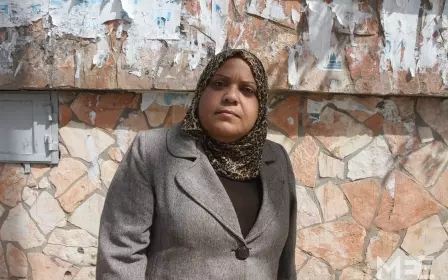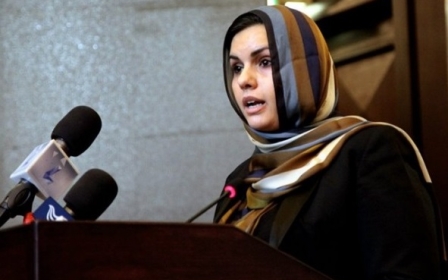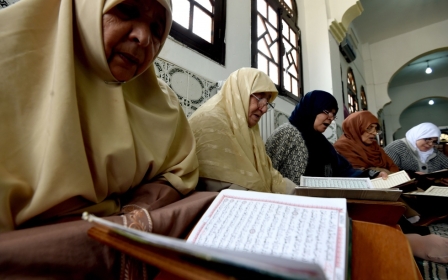The wives of Turkey's missing and a gender view of human rights
Kiraz Sahin was 20 years old when her husband Ismail Sahin was "disappeared" from the streets of Istanbul. It was January 1996; their daughter was then four years old, their son, one-and-a-half. Hundreds had already disappeared in Turkey - most are presumed to have been the victims of political murders, killed by Turkish security forces.
For 19 years, Kiraz Sahin struggled to find her husband, an experience she shared with hundreds of other wives. She never remarried, nor took formal work. With the support of family and friends she raised her children, cared for members of her husband's family, and became a grandmother, said Human Rights Association (IHD) members in Istanbul who knew her. She joined Saturday Mothers - now often referred to as the Saturday People - a group made up mostly of loved ones of other "disappeared" people. The group still gathers every Saturday at noon on central Istanbul's Galatasaray Square to commemorate and protest. In the past, the meetings were little tolerated, and even outlawed. Kiraz Sahin, like many Saturday gatherers, was repeatedly tear-gassed, beaten by police and arrested, IHD members said.
In January this year, on the 19th anniversary of Ismail Sahin's disappearance, Kiraz Sahin was unable to attend the Saturday Mothers' meeting. The best she could manage was to send along a recorded message to be played for those gathered on the square over the group's loudspeaker.
"As soon as I get up and out of this hospital bed," they heard her say, "I'll be there with you with my grandkids."
On Friday, 27 February, 2015, Kiraz Sahin died from stomach cancer.
"Kiraz Sahin was made to fit a 19-year search into 40 years of life," Maside Ocak, sister of another disappeared man, Hasan Ocak, told the next day's Saturday Mothers crowd. "Kiraz's life was still not long enough to learn the fate of her husband."
Up to 1500 people are thought to have been "disappeared" in Turkey since the 1980 coup d'etat, according to the Truth Justice Memory Centre in Istanbul. Hundreds more were victims of extrajudicial killings or died while in state custody. Such incidents peaked in the 1990s during a period of heavy fighting between the Turkish state and the Kurdistan Workers' Party (PKK), the 30-year conflict that has claimed 40,000 lives since 1984. While Kiraz Sahin's husband was a Turkmen Alevi and was disappeared from Istanbul, most of the disappeared were Kurds who went missing from Turkey's predominantly Kurdish southeast. Ninety-seven percent of the victims were male.
Ismail Sahin worked for the Istanbul municipality as a street cleaner. He disappeared while working along the very streets in central Istanbul where the Saturday Mothers gather today. The government shows little interest in investigating. Sahin's fate, like 67 percent of the forcibly disappeared, according to the Truth Justice Memory Centre, remains unknown. Ismail Sahin was a member of the Genel-Is trade union. His wife, Kiraz, had few politics to speak of.
"She was an apolitical person from an apolitical family," Zeynep Yildiz of the IHD told Middle East Eye. "She became politicised after her husband's disappearance."
Ripped from the sidelines of disaster
The wives, like Kiraz Sahin, have been at the forefront of the search and struggle for answers; their stories, human rights researchers in Turkey say, have been neglected for too long.
"I read every report on enforced disappearances in Turkey and I could find no references to gender," Ozgur Sevgi Goral, project director at the centre, told MEE during an interview at the organisation's offices.
"This was very striking because a disappearance is a very gendered process," she said. "The males are disappeared, firstly... . And secondly, the females are the ones looking for the [disappeared] males."
During field research Truth Justice Memory Centre staff noticed a trend. "Wives were always saying, 'It's not worth talking about me. Let's talk about him. Let's talk about what happened that day.' This was really heartbreaking for us," Goral said.
"It is hugely important what happened to the [women] for two reasons. First, you don't have a holistic story if you don't know what happened afterwards. An enforced disappearance is not a moment of catastrophe," she said. The before and after, characterised by the conflict and human rights violations that pervaded Turkey at the time, reveal the broader significance of the trauma, she said.
"You don't understand the outrageous aspect of the enforced disappearance if you don't know what happened after. Because what happened after is a tragedy. How did they raise their children?…How did they survive economically?…Were they forced to remarry?"
The necessity of the gender lens
In 2013, the United Nations Working Group on Enforced and Involuntary Disappearances wrote "...the effects of enforced disappearances are lived and faced in different ways by women and girls due to gender roles, which are deeply embedded in history, tradition, religion and culture."
The observation has been borne out in Turkey in several particular ways. Patriarchal and traditional gender roles and family structures often produce an ambiguous identity for wives of the disappeared, Goral said. A 2014 report published by the Truth Justice Memory Centre, describes these women as "neither 'married', nor 'widowed', nor 'divorced'" and details how this complex social burden has interacted with identity, social status and the challenges of day-to-day living. Many wives must assume their husbands' responsibilities in the male-dominated society outside of the home.
Often these women can't speak Turkish; for years speaking Kurdish was forbidden in any official setting or institution.
Not only has this been an obstacle in daily life. "It changes the pattern of the search," Goral said. Non-Turkish speaking women cannot easily apply to local authorities for information about their husbands and often have to pursue less formal investigations. "It's another way women are prevented from having access to justice."
On average, the wives of the disappeared married at 15. Many have faced pressure to remarry, often to a brother-in-law, after a disappearance. Though many have refused, re-marrying can offer economic, social and emotional benefits and can relieve women of traditional connotations. As one woman told researchers, her rationale for re-marrying included "so that people don't call me a harlot."
Wives of a disappeared man can receive certain state benefits, but the husband's status must be defined as either "absent" or dead. Judicial and bureaucratic complications aside, the report's authors describe how many women resist the additional emotional trauma of having to formalise their husband's death.
"There is this pendulum of hope for the wives of the disappeared. Normally, at the end of one week they know he is dead… But still there are processes of waiting. Up to three years they have more hope… Maybe he escaped, they think, maybe he went to South Kurdistan [northern Iraq]."
Hopes are also kept alive by what Goral described as an "industry": people who often appear to be connected to security forces call or contact the family to offer information for money. "And the families, they pay," Goral said. The tip-offs are invariably lies.
Many wives and other family members refuse to rule out the possibility the disappeared will one day return. Goral described one wife who still rejects sympathetic eyewitness accounts of her husband's death (he was strapped tight with hand grenades and blown up), preferring, in her distressed mind, to believe her husband had in fact defected and become a Turkish intelligence agent.
A broader struggle
Women's rights are at the top of the national agenda in Turkey today. Turkish activists, journalists and politicians are working to raise awareness about what is a dismal situation. (See also here.) Their work is complicated. Turkish president Erdogan famously claimed last year that women and men cannot be seen as equals. (See here for more.)
But the struggle of the women who have been affected by enforced disappearances should not be mistaken as a simple subset of this struggle, Goral said. A gendered view of a human rights violation reveals the depth and diversity of the impact of the violation and allows us to have a broader view beyond that of the most obvious victims.
"Seeing the gendered, hierarchical relations within a human rights violation…is not the same thing as militating for women's rights. It's more than that," Goral said.
In having to overcome these hardships, the networks of solidarity and activism that these women have created have, despite the catastrophe at the core of their experience, produced something that may have otherwise proven elusive, Goral said.
"They have been empowered by a tragic event."
New MEE newsletter: Jerusalem Dispatch
Sign up to get the latest insights and analysis on Israel-Palestine, alongside Turkey Unpacked and other MEE newsletters
Middle East Eye delivers independent and unrivalled coverage and analysis of the Middle East, North Africa and beyond. To learn more about republishing this content and the associated fees, please fill out this form. More about MEE can be found here.




